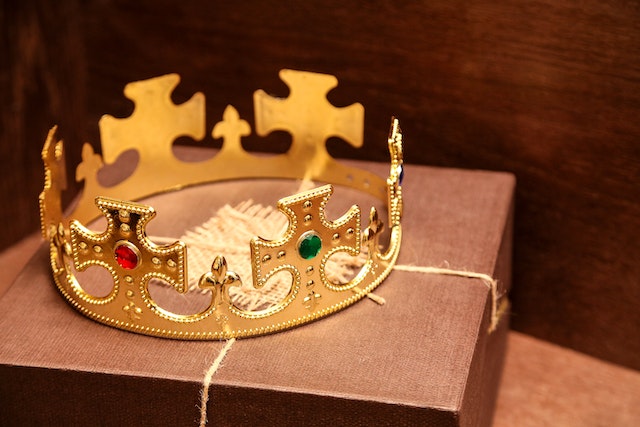
Who was the first king? This could be a question that is impossible to answer because most of the records of early rulers have disappeared or there is no way to separate myth from truth. It also depends on what the definition of king is. At what point does somebody go from being a tribal leader or a chieftain to being a king?
The modern definition of king is, from the Merriam Webster dictionary, “a male monarch of a major territorial unit, especially one whose position is hereditary and who rules for life.” The “rules for life” part and the “hereditary” part were probably later additions to the idea of a king because early kingdoms were not necessarily inherited but fought for and kings might not last their lifetime.
So, to have a king, you need to have some land and some people to rule over. The first place where people came together into urban cities was in Mesopotamia. Mesopotamia was approximately where Iraq, Iran, Kuwait, Syria, and Turkey are today. People started to group together there after they moved from hunter-gathering to agriculture and there is evidence of a village dated to about 7500 BC. Over the next few thousand years more settlements sprang up and then they started to group together. As the groups became larger, the groups would have presumably had some kind of leadership structure. These people could have been tribal leaders or chieftains. The settlements weren’t large enough for them to be styled “king” yet. By 4000 BC the first cities had appeared. Uruk is the most famous of these and by 3000 BC it was a walled city with over 100,000 people living in it. This could probably be called “a major territorial unit” and this could be the time when the first kings appeared. The problem is, that there was no system of writing yet. A system of pictographs had sprung up by about 3400 BC, but it wasn’t a proper writing system until 2600 BC when it evolved into cuneiform. That means it is very difficult to know who ruled these cities because there was no way of writing about them.
There is a list of the early kings of Sumer called, rather unsurprisingly, the Sumerian King List. There are several copies in existence, and they all differ ever so slightly, due to copying errors. They are written on clay tablets in Sumerian and the earliest tablets have been dated to about 2112 BC. It lists kings going back to what it calls the first king: Alulim. He could be the first king, except, there is no doubt that this is a mythical figure. The Sumerian King List says that he was appointed by the gods and reigned for 28,000 years. He was succeeded by Alalngar, who was said to rule for 36,000 years. Even if they exaggerated the lengths of their reign, there is no evidence to say that these kings were real. They are probably part of the Sumerian creation myth. This is further evidenced because the first 8 kings ruled for over 250,000 years and then there was a devastating flood that cleaned away the old civilization and allowed a new one to grow. This flood story is the origin of the one that ended up in the Old Testament of the Bible.
The first king on the Sumerian King List that can be proven to be real is Emmebaragesi, who was probably king in 2600 BC, although some people think it might have been as early as 2900 BC. There are four inscriptions using his name and one of them calls him king. So, does that make him the first king in the world? No, unfortunately not. Some of the kings before him may be real, but there is no evidence. If we take Emmebaragesi to be the first king of Sumer, then he was beaten to the record of first king by at least 200 years.
In approximately 3100 BC, Narmer became pharaoh of a unified Egypt. He is the first king of Egypt, and he is responsible for unifying the country. All of these dates are only approximations because there is absolutely no way of knowing exactly. It is thought that he unified Egypt because he is pictured on an ancient tablet wearing the crowns of both Upper and Lower Egypt. He wouldn’t have called himself pharaoh because that title wasn’t used until 1000 BC, but he might have called himself king and he might have been the first king.
All of this is conjecture because there is just no way of knowing. There was no written system until these ancient civilizations had been around for several thousand years and archaeologists and historians have to try to work out what is real and what isn’t just by looking at inscriptions and hieroglyphics. And this is what I learned today.
Photo by Dmitry Sidorov: https://www.pexels.com/photo/close-up-shot-of-king-s-crown-on-brown-box-7015157/
Sources
https://www.nationalgeographic.com/culture/article/king-sargon-akkad
https://www.getty.edu/art/exhibitions/mesopotamia/explore.html
https://science.howstuffworks.com/environmental/earth/archaeology/first-king.htm
https://en.wikipedia.org/wiki/Sumerian_King_List
https://en.wikipedia.org/wiki/Genesis_flood_narrative
https://en.wikipedia.org/wiki/Enmebaragesi
https://en.wikipedia.org/wiki/Alulim
https://en.wikipedia.org/wiki/History_of_Mesopotamia
https://www.worldatlas.com/who-was-the-first-king-in-the-world.html
https://www.history.com/news/first-earliest-human-civilizations

Pingback: #732 Why was Mesopotamia the cradle of civilization? | I Learned This Today